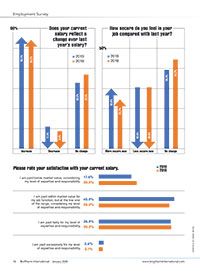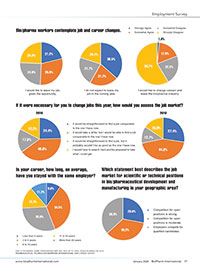
- BioPharm International-01-01-2020
- Volume 33
- Issue 1
Choices for Climbing the Biopharma Career Ladder
With a positive employment market, some biopharma professionals explore options for career advancement.
An employee’s view of the job market is often colored by recent work experiences-whether positive or negative-and their most recent salary increase. Professionals working in biopharma drug development and manufacturing are concerned about the size of their paychecks, but other factors-including challenging work, job security, and company stability-may be more important when making career change decisions.
Insight provided by bio/pharma professionals from around the world responding to BioPharm International’s annual employment survey (1) indicates strong confidence in the biopharma industry (66% expect business improvement in 2020) and some confidence in prospects for their employer (52% expect business improvement in 2020). More than half of the respondents, however, expressed interest in seeking better opportunities beyond their current position. (See the infographics on pages 16–17 for an overview of survey results.)
Job insecurity, company restructuring, a lack of training, an unsatisfactory work/life balance, and uncertainty about the company’s performance or success were the top reasons for job dissatisfaction.
Similar to previous surveys (2–3), more than half of all respondents said they would like to leave their jobs, given the opportunity; however, 58% said they do not expect to leave in the coming year. A significant segment, 19%, said they would like to change careers and leave the bio/pharma industry.
Employees working in the biologic drug segment reported more satisfaction with their current positions. Only 17.3% of biologics respondents agreed strongly that they would like to leave their job, given the opportunity, compared with 25% for those working in the small-molecule segment.
Prime time for a job change?
Click image to view Infographic.
Survey results indicate bio/pharma professionals are on the move. More than 44% of 2019 respondents-compared with one-third in 2018-said they stayed with the same employer, on average, for five or fewer years. Respondents working in large-molecule drug development and manufacturing stayed with the same employer longer than those in the small-molecule market segment.
More than one-quarter of the respondents said they voluntarily changed jobs in the past two years. The reasons cited-with multiple choices allowed-were to pursue a better career opportunity (72.7%), find more challenging work (40%), or to seek a better work-life balance (32.7%). Those working in the biologic drug segment valued company stability more than their counterparts in the small-molecule segment, who said job security was more important.
Salary was the fifth most-cited single reason for job change, trailing work/life balance, professional advancement, intellectual challenge, and job security. Nearly two-thirds of the respondents were confident they could find a job similar to their current position, should they choose-or were forced-to find new employment.
In the past two years, nearly one-quarter of the respondents said their company experienced a merger or acquisition, up from 18.1% in the previous survey; an additional one-quarter of the respondents reported that their companies had been through a downsizing or restructuring. Nearly 20% of the respondents said they left the company due to such an acquisition, downsizing, or restructuring.
Respondents suggest there is a positive market for job seekers; 36.8% of respondents said there are few qualified candidates for open scientific/technical positions (almost 40% for biologics positions), compared with 30.3% in 2018. A smaller percentage (28% in 2019 vs. 34.2% in 2018) said there were more qualified candidates than open positions. As in previous surveys, respondents expressed somewhat negative opinions about the knowledge and skill sets of new hires; 73% said the new hires were adequately trained but not exceptional; 18% said they were poorly trained.
In 2019, more respondents said they felt more secure in their position compared with the previous year (30% in 2019; 25% in 2018; 19.1% in 2017). Another 30% said they felt less secure, similar to the response rate of previous years. Interestingly, those working in the biologic drug sector felt more secure in their jobs than those in the small-molecule sector. In addition, only 22.6% said they felt less secure in their jobs than the previous year, compared with 34.5% in the small-molecule sector.
Weighing the compensation factor
Click image to view Infographic.
Salary ranked sixth on a list of 12 factors contributing to job satisfaction, up from ninth place in 2018. Compensation trailed factors such as challenging projects, intellectual stimulation, company’s potential for success, a good work/life balance, and supportive management as the “main reason I come to work.”
Satisfaction with compensation has trended downward during the past few years. More than 39% said they were paid fairly or excessively in 2019, compared with 41% in 2018 and 46% in 2017. In 2019, more than 40% of those surveyed said their pay was at the low end of the salary range for their expertise and responsibility; 17.6% said they were paid below market value.
The number of people reporting salary increases was stagnant from 2018 (54.1%) to 2019 (55.4%), following a drop from nearly 63% in 2017. The number of people reporting a decrease in salary ticked up from nearly 9% in 2018 to 11.4% in 2019.
More than one-quarter of respondents said they used their full allotment of vacation, personal, and sick time while 37% said they used less than half of the available time off.
Respondent profile
More than 220 bio/pharma professionals from around the world responded to the survey, which was fielded in November and December 2019. Respondents primarily were from innovator bio/pharmaceutical companies (31.3%), generic-drug manufacturing companies (13.3%), and contract research and manufacturing or consulting organizations (17.6%).
The respondents were involved in developing or manufacturing a range of drug types-with some listing multiple types-including small-molecule drugs (58.9%), large-molecule drugs (45.1%), vaccines (19.8%), cell therapies (17.8%), gene therapies (17.8%), and nutraceuticals (17.3%).
Respondents work at small and large companies and are responsible for R&D, process development, technology transfer, validation, quality control/assurance, formulation, manufacturing, and other functions. Nearly 40% of the respondents held a doctorate or higher degree; more than one-third held at least a Master’s degree.
Compared with previous years, the respondents had slightly less experience working in the bio/pharma industry; 26.9% had fewer than 10 years of experience, 25.6% had 10–20 years, 36.9% had 20–35 years of experience, and 12.1% have worked in the industry for more than 35 years.
Respondents working in the small-molecule drug arena worked more hours compared with peers in the biologic-drug segment. More than 37% reported working more hours than the previous two years, compared with 30.7% for the biologics workers.
References
1. BioPharm International, 2019 Pharmaceutical Technology/BioPharm International Employment Survey, December 2019.
2. BioPharm International, 2018 BioPharm International Employment Survey, December 2018.
3. Pharmaceutical Technology, 2018 Pharmaceutical Technology/Pharmaceutical Technology Europe Employment Survey, December 2018.
Article Details
BioPharm International
Vol. 33, No. 1
January 2020
Pages: 14–18
Citation
When referring to this article, please cite it as R. Peters, “Choices for Climbing the Biopharma Career Ladder,"BioPharm International 33 (1) 2020.
Articles in this issue
about 6 years ago
Faster, Better Bioprocessing in 2020about 6 years ago
Can Policy Keep Pace with Science and Discoveries?about 6 years ago
Mapping a Route for Cell and Gene Therapy Process Developmentabout 6 years ago
Pharma Regulation to be Shaped by Pricing and Production Issuesabout 6 years ago
Lyophilization Presents Complex Challengesabout 6 years ago
Single-Use Bioreactors: To Scale Up or Scale Out?about 6 years ago
Therapeutic Potential of Green, Synthesized Gold Nanoparticlesabout 6 years ago
Getting to the Root of Quality Problemsabout 6 years ago
BioPharm International, January 2020 Issue (PDF)Newsletter
Stay at the forefront of biopharmaceutical innovation—subscribe to BioPharm International for expert insights on drug development, manufacturing, compliance, and more.






